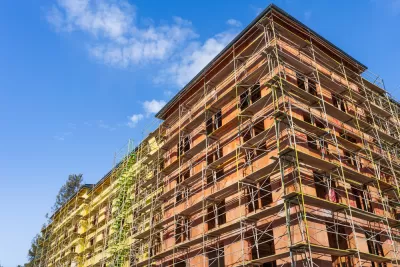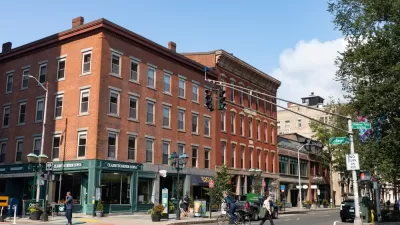The $1.7 trillion spending bill approved by Congress earlier in December includes a significant first: $85 million in discretionary grant funding for local governments to remove obstacles to housing development.

Congress passed a $1.7 trillion spending bill on December 20, sending the bill onto President Biden for a signature. The New York Times provides news coverage of the bill’s approval and CNN provides details of what’s included in the bill.
One program of particular interest to planners, the bill includes $85 million for a new U.S. Department of Housing and Urban Development (HUD) planning incentive program advocated by the National Multifamily Housing Council (NMHC) and National Apartment Association. According to an article by Paul Bergeron for Globe St, the “Yes In My Back Yard” program is designed “to help localities eliminate exclusionary policies, zoning and density restrictions, onerous parking requirements and other regulations.”
“The grant program will help fund efforts by local communities to update their zoning codes and community engagement to remove obstacles to affordable housing production and preservation,” adds Bergeron.
A statement by the NMHC describes the new grant program as the first federal YIMBY policy that will be enacted into law. U.S. Senator Todd Young (R-Indiana) first introduced the Yes In My Backyard Act into Congress in 2019.
According to another article by Christian Britschgi for Reason, the YIMBY Act gained support from the Biden campaign in 2020, but also again after the Biden administration entered office. “In its Housing Supply Action Plan from May 2022, the White House also said it would retool discretionary transportation grant programs (worth a collective $6 billion) to incentivize liberalizing zoning reforms,” according to Britschgi.
Britschgi does caution that the $85 million in funding for the new program is unlikely to produce much progress on zoning reform.
“For starters, the bill would provide money to jurisdictions for identifying and removing barriers to affordable housing production. Once given, the money could be spent on improving "housing strategies," implementing "housing policy plans," and facilitating affordable housing production,” writes Britschgi.
“Taken together, that sounds like the program would pay jurisdictions just for drawing up plans for improving housing production, an approach that some housing economists have argued is ineffective.”
FULL STORY: A First: NIMBY-Opposition Funds Included in Congress' Annual Funding Bill

Maui's Vacation Rental Debate Turns Ugly
Verbal attacks, misinformation campaigns and fistfights plague a high-stakes debate to convert thousands of vacation rentals into long-term housing.

Planetizen Federal Action Tracker
A weekly monitor of how Trump’s orders and actions are impacting planners and planning in America.

Chicago’s Ghost Rails
Just beneath the surface of the modern city lie the remnants of its expansive early 20th-century streetcar system.

Bend, Oregon Zoning Reforms Prioritize Small-Scale Housing
The city altered its zoning code to allow multi-family housing and eliminated parking mandates citywide.

Amtrak Cutting Jobs, Funding to High-Speed Rail
The agency plans to cut 10 percent of its workforce and has confirmed it will not fund new high-speed rail projects.

LA Denies Basic Services to Unhoused Residents
The city has repeatedly failed to respond to requests for trash pickup at encampment sites, and eliminated a program that provided mobile showers and toilets.
Urban Design for Planners 1: Software Tools
This six-course series explores essential urban design concepts using open source software and equips planners with the tools they need to participate fully in the urban design process.
Planning for Universal Design
Learn the tools for implementing Universal Design in planning regulations.
planning NEXT
Appalachian Highlands Housing Partners
Mpact (founded as Rail~Volution)
City of Camden Redevelopment Agency
City of Astoria
City of Portland
City of Laramie




























